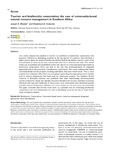Tourism and biodiversity conservation: the case of community-based natural resource management in southern Africa

View/
Date
2013-01-10Author
Mbaiwa, Joseph E.
Kolawole, Oluwatoyin D.
Publisher
CAB International Publishing, www.cabi.orgType
Published ArticleMetadata
Show full item recordAbstract
This review analyses the potential of tourism to contribute to biodiversity conservation with particular reference to developing countries. In the last quarter of a century, there has been a global concern about the extent of biodiversity decline. Biodiversity decline is partly a result of the overutilization of resources by local communities who live in resource-rich areas. This review makes use of published and unpublished articles and reports on community-based approaches to biodiversity conservation. Focus was paid to the role that community-based or integrated approaches play in the promotion of biodiversity conservation. The review indicates that where community-based tourism projects are being undertaken, they have mixed results. That is, some projects have collapsed, while others are succeeding in generating the expected economic benefits such as income, employment and funds used for community projects. The Southern African countries of Botswana, Namibia and Zimbabwe have been implementing community-based tourism projects for almost two decades. Economic benefits from tourism contribute to poverty alleviation and improved livelihoods. In the process, local communities have developed positive attitudes towards biodiversity, and hence are more inclined to use such resources sustainably. The paper concludes that tourism could serve as a potential tool for stimulating biodiversity conservation and rural development not only in developing countries but also in other similar social–ecological contexts.
Collections
- Research articles (ORI) [270]
